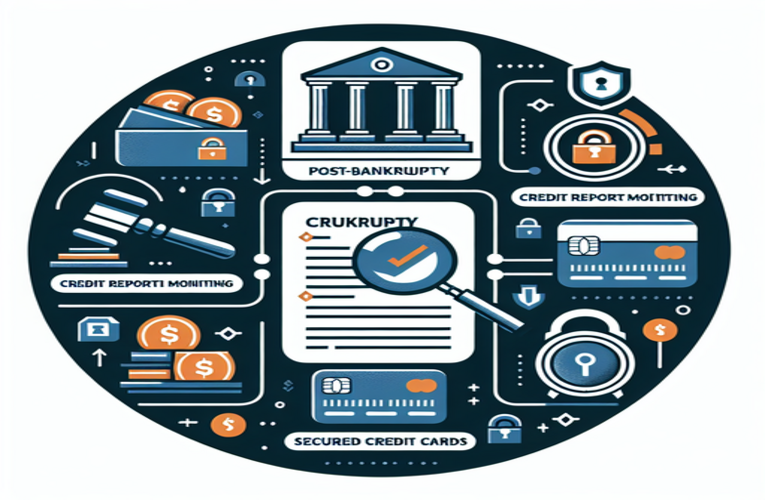Using AI for better loan and credit management: enhancing approval processes and risk assessment
In today’s fast-paced financial landscape, the integration of artificial intelligence (AI) is reshaping how financial institutions manage loan approvals and credit scoring. As lenders strive for greater efficiency, the role of AI has become pivotal in streamlining loan processing and enhancing credit management. By leveraging AI-powered technologies, banks and lending institutions are automating approval processes that traditionally took days or weeks, thereby improving decision-making and reducing risk. In this article, we will explore how using AI for better loan and credit management is not only expediting loan decisions but also refining credit assessments through improved accuracy and advanced data analytics.
Topics discussed in this article include:
- The mechanisms by which AI accelerates loan processing and approval times
- AI’s role in automating credit risk assessments and mitigating fraud
- The advantages of AI-driven document processing automation in financial evaluations
- Addressing potential biases and ensuring ethical practices in AI-powered lending systems
By understanding these elements, readers will gain valuable insights into how AI is revolutionizing credit management and transforming the dynamics of loan and credit processes, paving the way for a more efficient and inclusive financial future. Whether you are a borrower looking to navigate the lending landscape or a financial professional aiming to adapt to new technologies, this article will provide the information needed to harness the full potential of AI-powered solutions in loan and credit management.
Table of Contents
Revolutionizing Loan Approval Processes with AI
The integration of artificial intelligence (AI) into the financial services sector is fundamentally transforming loan approval processes and enhancing credit and loan management. By leveraging advanced AI technologies for improved loan and credit management, lenders can dramatically shorten the time frame from application submission to final approval. For example, AI-enabled systems can evaluate and process a loan application in as little as 30 to 60 seconds, compared to conventional methods that typically require several days or weeks. This expedited process is achieved through sophisticated data handling methods that minimize manual errors and streamline verification stages.
Companies like Upstart and Zest AI have developed AI-driven platforms that assess borrower risk more accurately by analyzing thousands of data points. This not only speeds up the approval process but also increases the accessibility of loans to a broader range of applicants. According to a report by McKinsey & Company, financial institutions adopting AI technologies have seen processing costs reduced by up to 40%, while increasing revenue through better customer acquisition and retention strategies.
Key Benefits of AI in Credit and Loan Management
-
Automated Risk Assessment
One significant advantage of utilizing AI is the integration of automated risk assessment tools. These tools analyze numerous data points, including a borrower’s spending habits, income-to-debt ratios, and even alternative data sources like utility payments and rental history. By doing so, lenders gain insights that lead to more accurate credit scoring, with potential approval precision increasing significantly. Furthermore, AI algorithms can explore unconventional data sources, such as online behavior and purchasing patterns, offering a more comprehensive understanding of a borrower’s creditworthiness. According to ResearchAndMarkets.com, AI-driven risk assessment can reduce default rates by up to 50%, enhancing the overall quality of loan portfolios.
-
Fraud Detection and Prevention
The implementation of AI plays a crucial role in mitigating fraud risks. Employing advanced machine learning techniques enables lenders to identify anomalies and patterns indicative of fraudulent behavior, protecting both financial institutions and consumers. A recent study by the Association of Certified Fraud Examiners showed that AI-driven fraud detection systems could lower financial losses by up to 60%. Machine learning models continuously learn from new data, improving their ability to detect sophisticated fraud attempts over time. This proactive approach ensures a more secure financial environment for all parties involved while maintaining the integrity of the loan management process.
-
Improved Customer Experience
AI enhances the customer experience by providing quicker responses and personalized services. Chatbots and virtual assistants can assist applicants at any time, answering queries and guiding them through the application process. According to a survey by Accenture, 75% of banking customers expect services to be faster and more convenient, and AI helps meet these expectations by reducing wait times and simplifying interactions.
-
Cost Reduction and Operational Efficiency
By automating routine tasks, AI reduces the need for manual intervention, leading to significant cost savings. Deloitte reports that banks implementing AI solutions have observed operational cost reductions of up to 25%. Automation allows staff to focus on more strategic activities, such as building customer relationships and developing new financial products.
-
Expanded Access to Credit
Using AI for better loan and credit management also means that underserved populations have improved access to financial services. Traditional credit scoring models often exclude individuals with limited credit histories. AI algorithms can assess creditworthiness based on additional data sources, enabling lenders to offer loans to individuals who might otherwise be denied. This inclusivity not only benefits consumers but also opens new markets for financial institutions.
Examples of AI Applications in Financial Services
| Application | Function | Benefit |
|---|---|---|
| Automated Underwriting Systems | Assess borrower information using AI algorithms | Speeds up approval process and reduces manual errors |
| Risk Modeling Software | Predicts potential defaults by analyzing diverse data sets | Improves risk assessment accuracy and portfolio quality |
| Fraud Analytics Platforms | Detects suspicious activities through pattern recognition | Reduces fraud-related losses and enhances security |
| Chatbots and Virtual Assistants | Interact with customers to provide support and information | Enhances customer service and satisfaction |
| Credit Scoring Solutions | Evaluate creditworthiness using alternative data | Expands access to credit for underserved populations |
Incorporating AI into loan approval processes and credit management is revolutionizing the lending industry. With the potential for faster approval times, increased accuracy in borrower evaluations, and robust fraud detection capabilities, AI not only streamlines operational workflows but also enhances customer satisfaction. By embracing these advanced technologies, financial institutions can thrive in a dynamic market landscape, catering to a broader range of borrowers while maintaining a secure and efficient lending environment. As AI continues to evolve, its role in delivering better loan and credit management solutions will become increasingly critical for staying competitive in the financial sector.
The Impact of Artificial Intelligence on Risk Management and Credit Scoring
Artificial intelligence is reshaping the landscape of risk management and credit scoring, providing financial institutions with powerful tools to assess and manage risk more effectively. By leveraging machine learning algorithms and big data analytics, organizations can process vast amounts of information, uncover hidden patterns, and make informed decisions in real-time. Using AI for improved loan and credit management allows for more precise borrower evaluations, reduces default rates, and enhances overall financial stability.
- Traditional Risk Assessments: Often depended on limited information, possibly neglecting crucial borrower details due to reliance on standard credit reports and FICO scores. This approach may overlook individuals with thin credit files or those who have non-traditional income sources.
- AI-Driven Algorithms: Evaluate a wide range of factors, such as transaction histories, social media activity, education, employment history, and even psychometric data. By incorporating alternative data sources, AI models provide a more holistic view of a borrower’s financial behavior and potential risk.
Efficiency and Accuracy in Credit Scoring
Extensive research indicates that AI can boost credit scoring accuracy to around 99%, significantly reducing default rates and leading to more informed lending decisions. For instance, a study by the World Bank found that machine learning models could improve default prediction rates by up to 15% compared to traditional logistic regression models. This improvement translates into substantial cost savings and risk reduction for lenders.
- Machine Learning Models: Excel in recognizing and adapting to emerging patterns within vast data sets. They continuously improve as more data becomes available, allowing for dynamic adjustments to risk assessments. Companies like LenddoEFL use machine learning to analyze non-traditional data, enabling lenders to extend credit to individuals with no formal credit history.
- Real-Time Evaluations: Enable immediate detection of anomalies potentially indicating fraudulent activities. Real-time data processing helps in making instantaneous credit decisions, enhancing customer experience. PayPal, for example, uses real-time machine learning algorithms to assess transaction risks quickly.
- Reduction in Processing Times: Incorporating AI can cut processing times by as much as 70%, translating to cost savings and enhanced customer satisfaction. A report by PwC highlights that AI can significantly reduce loan processing times from days to minutes, offering a competitive advantage in customer service.
Minimizing Human Error
Integrating AI into risk assessment minimizes human error, which is crucial for maintaining precision in financial operations. Manual processes are prone to mistakes due to fatigue, oversight, or bias. AI systems provide consistent and objective analysis, ensuring that all assessments adhere to predefined criteria. This consistency not only improves accuracy but also enhances regulatory compliance by maintaining detailed records of decision-making processes.
Current Trends and AI Integration
The demand for quicker, more accurate financial services drives the application of AI in risk management. Many financial institutions are exploring:
- Predictive Analytics: Helps respond swiftly to market dynamics by forecasting trends and customer behaviors. Predictive models can anticipate shifts in economic conditions, allowing lenders to adjust their strategies proactively.
- Innovative Risk Assessments: Supports sustainability and enhances risk management strategies by incorporating environmental, social, and governance (ESG) factors. AI can analyze ESG data to assess long-term investment risks and opportunities.
- Natural Language Processing (NLP): Extracts meaningful insights from unstructured data such as emails, reports, and social media, enriching the risk assessment process.
Automating Document Processing to Enhance Accuracy in Financial Assessments and Approvals
In the rapidly changing landscape of finance, automation of document processing has emerged as a transformative force, greatly improving accuracy in financial evaluations and approvals. By using AI for better loan and credit management, financial institutions can optimize workflows, minimize human error, and expedite loan approvals that align with customer needs.
- Optimize workflows by eliminating manual data entry and verification processes, allowing for faster turnaround times in loan processing.
- Minimize human error by utilizing AI algorithms that consistently and accurately extract data from complex documents, reducing the risk of misinterpretation or oversight.
- Expedite loan approvals that align with customer needs by rapidly analyzing applicant information and providing instant feedback on eligibility.
Research indicates that integrating AI in document processing can elevate data accuracy by up to 90% and reduce processing times by as much as 70%. For example, JPMorgan Chase’s COiN platform uses AI to review legal documents, resulting in savings of over 360,000 hours of annual work by lawyers and loan officers.
Benefits of AI in Financial Document Processing
- Crucial Information Extraction: AI systems deftly extract important data from financial documents, such as income statements, credit memos, and identification forms. Technologies like NLP analyze unstructured data, enhancing the ability to interpret complex financial information.
- Enhanced Creditworthiness Evaluation: Lenders can evaluate borrower creditworthiness with exceptional precision by accessing a broader range of data points. AI models assess factors like cash flow patterns and spending behaviors, providing deeper insights into financial stability.
- Inclusive Data Sources: Incorporation of alternative data like transaction records or social media insights enriches the credit assessment process. This approach can identify creditworthy individuals who might be overlooked by traditional methods. According to Equifax, using alternative data can increase approval rates by up to 15% without increasing risk.
These capabilities present a comprehensive picture of a borrower’s financial behavior and trustworthiness, enhancing access to credit for historically underserved populations. By enriching the assessment procedure, financial institutions can make informed and equitable loan approvals.
Addressing Algorithmic Bias and Ethical Practices
While embracing the benefits of automated document processing, it is crucial to be aware of potential algorithmic biases. Implementing ethical AI practices involves:
- Ensuring technological advancements benefit all users fairly by designing algorithms that are transparent and inclusive.
- Safeguarding customer data privacy through robust security measures and compliance with regulations like GDPR and CCPA.
- Optimizing efficiency and precision of lending operations while regularly auditing AI systems to detect and correct biases.
Financial institutions must collaborate with regulators, technologists, and ethicists to develop AI systems that are fair and accountable. Initiatives like the Responsible AI practices advocated by the Financial Stability Board emphasize the importance of managing risks associated with AI deployment.
The Future of Financial Automation
In the current era of transformation, leveraging AI for automating document processing transcends mere efficiency; it aims to create a more accurate, dependable, and customer-centric financial ecosystem. As financial institutions continue to explore innovative automation strategies, they will contribute to a landscape that values accuracy, fairness, and accessibility. Embracing these changes not only enhances operational effectiveness but also drives forward the evolution of credit risk management, ensuring fair treatment for all borrowers in the eyes of lenders.
Summary
- Impact of AI on Loan Approvals: Leveraging artificial intelligence for loan and credit management significantly reduces loan approval times, processing credit applications in 30-60 seconds compared to traditional methods that take days or weeks.
- Automated Risk Assessment: AI-powered credit scoring tools enhance accuracy, reaching approximately 99%. These machine learning applications analyze diverse data sets, providing comprehensive insights into borrower creditworthiness and improving overall credit management processes.
- Fraud Detection: AI’s advanced machine learning capabilities detect fraudulent behaviors, reducing financial losses by up to 60%. This enhances the overall security of the lending process and ensures safer credit management practices.
- Consumer Awareness: It is essential for consumers to understand how AI-driven loan approvals influence their financial decisions, enabling them to make informed choices regarding credit and loan management.
- Continuous Innovation: The integration of AI technologies represents a permanent shift in the lending industry, necessitating ongoing adaptation by financial institutions to utilize artificial intelligence for better loan and credit management and remain competitive.
- Document Processing Automation: AI enhances the accuracy of financial evaluations, increasing data precision by up to 90% and reducing processing times by 70%. This automation streamlines loan processing and credit management tasks effectively.
- Addressing Bias and Ethics: The adoption of ethical AI practices is crucial to ensure fairness and privacy in loan and credit management. Preventing algorithmic biases and maintaining data protection are essential for trustworthy AI implementations.
By recognizing these elements, you can appreciate how artificial intelligence is transforming loan and credit management practices and the implications for borrowers and financial professionals alike.
FAQ
What role does artificial intelligence (AI) play in personalizing loan offers to borrowers?
Artificial intelligence (AI) systems can analyze a borrower’s unique financial history, credit scores, and behavioral data to customize loan offers that align with their specific financial needs and repayment capacities. This advanced personalization approach enhances borrower satisfaction and increases the likelihood of loan acceptance, making the lending process more efficient and borrower-centric.
How do lenders ensure the security of data used in AI-driven credit assessments?
Lenders implement stringent data security measures, including encryption, secure access protocols, and multi-factor authentication, to protect sensitive borrower information during AI-driven credit assessments. Compliance with regulatory standards such as GDPR and CCPA also plays a crucial role in maintaining data integrity and safeguarding against unauthorized access.
Can AI help in reducing interest rates for borrowers?
Yes, by providing more accurate credit assessments and lowering operational costs through automation, lenders can offer reduced interest rates to creditworthy borrowers. Efficient AI-based evaluations of risk and personalized loan offers contribute to a more competitive interest rate landscape, benefiting both lenders and borrowers.
What measures are being taken to address algorithmic bias in AI credit scoring?
Financial institutions are actively working to identify and eliminate algorithmic bias by conducting regular audits of their AI systems, diversifying data sources, and implementing fairness metrics. These measures ensure equitable treatment across different demographic groups and promote unbiased decision-making in AI-driven credit scoring models.
How can borrowers utilize AI-driven tools to improve their credit profiles?
Borrowers can leverage AI-driven financial management applications that provide insights into spending habits, monitor credit scores in real-time, and offer personalized advice on improving creditworthiness. These tools empower individuals to take proactive steps in managing their finances, leading to better credit profiles and increased loan approval chances.
What challenges do lenders face when integrating AI into their loan approval processes?
Lenders often encounter challenges such as the need for significant investment in advanced AI technologies, difficulties in integrating AI with existing legacy systems, and ensuring that staff are adequately trained to work alongside sophisticated AI tools. Additionally, maintaining data quality and addressing regulatory compliance can complicate the AI implementation process.
Is there a risk that AI could make lending decisions too automated and less human-centric?
While AI can streamline and enhance the efficiency of lending processes, it is vital for lenders to maintain a balance between automation and human oversight. Ensuring human intervention in complex cases allows for nuanced understanding and empathy in decision-making, preserving the human-centric aspect of lending while leveraging AI’s benefits.
How does AI improve the accuracy of credit scoring compared to traditional methods?
AI enhances credit scoring accuracy by analyzing a broader range of data points, including behavioral patterns, transaction histories, and alternative data sources. This leads to more comprehensive and precise assessments compared to conventional methods that often rely on limited financial history and basic credit metrics.
What impact does AI have on loan servicing after approval?
AI can significantly improve loan servicing by automating routine tasks, predicting borrower behavior, and identifying potential issues before they escalate. This allows lenders to offer timely assistance, optimize repayment plans, and maintain high levels of customer satisfaction throughout the loan lifecycle.
Are there any legal implications for lenders when using AI in the credit assessment process?
Yes, lenders must ensure that their AI systems comply with legal regulations regarding fair lending practices, data protection laws, and consumer rights. Failure to adhere to these regulations can lead to legal consequences, including fines, sanctions, and reputational damage. It is essential for financial institutions to stay updated with evolving legal standards and integrate compliance into their AI-driven credit assessment processes.
















